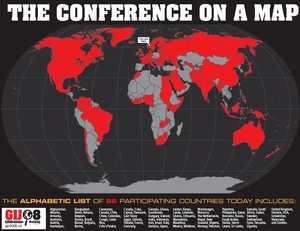A true global conference - 86 countries so far
From Marocco to Jamaica, from Lebanon to Finland, from Costa Rica to Kenya, from Russia to USA: The 5th Global Investigative Journalism Conference in Lillehammer will truly be a global event.
 xxx  These are the countries taking part in the Global Investigative Journalism Conference 2008 so far. Illustration: Kenneth Lauveng, VG. |
Many measures have been taken to avoid that GIJC2008 will be entirely dominated by “white journalists from rich countries”. A global conference should have a broad base of participants from around the world.
The support given from, among others, the Norwegian Ministry of Foreign Affairs, has allowed us to give out grants to journalists from Russia (and the former U.S.S.R), Eastern Europe, The Balkans, Caucasus, Middle East, Asia, Africa and Latin America.
In addition to this, we have had great success challenging Norwegian media houses to sponsor journalist colleagues from other countries. We hope that this initiative will ensure a greater participation of our far-travelling colleagues, and also encourage networking and future co-operation across borders and media organizations.
The alphabetic list of confirmed participating countries today includes:
Afghanistan, Albania, Armenia, Australia, Austria, Azerbaijan, Bangladesh, Benin, Belarus, Belgium, Bosnia, Brazil, Brunei, Bulgaria, Burma, Cameroon, Canada, Chile, China, Colombia, Congo, Costa Rica, Cote d'Ivoire, Croatia, Cuba, Denmark, East Timor, Egypt, Estonia, Finland, France, Germany, Georgia, Ghana, Guatemala, Hungary, Iceland, India, Indonesia, Iraq, Israel, Italy, Jamaica, Japan, Jordan, Kenya, Latvia, Lebanon, Liberia, Lithuania, Macedonia, Mauritius, Mexico, Moldova, Montenegro, Morocco, The Netherlands, Nepal, New Zealand, Nigeria, Cyprus, Norway, Pakistan, Palestine, Philippines, Qatar, Romania, Russia, Saudi Arabia, Serbia, Sierra Leone, Sri Lanka, Somalia, South Africa, Sudan, Sweden, Switzerland, Syria, Tanzania, Uganda, United Kingdom, Ukraine, USA, Uzbekistan, Venezuela and Zambia.
There is no limit as to how many countries that may be represented. However, different languages might be a barrier. As a primary guideline, we opt to have all debates and lectures in English.
But we don’t want to exclude non-English speaking participants and are working on the issue of simultaneous translations as well.

